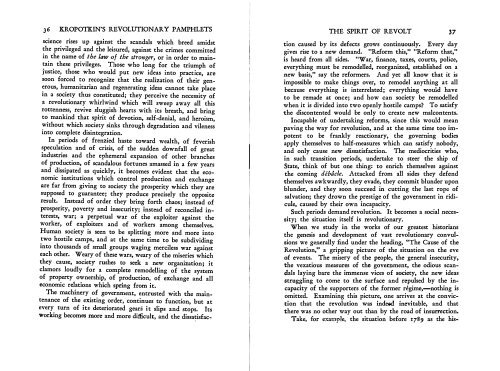Kropotkin's Revolutionary Pamphlets - Libcom
Kropotkin's Revolutionary Pamphlets - Libcom
Kropotkin's Revolutionary Pamphlets - Libcom
You also want an ePaper? Increase the reach of your titles
YUMPU automatically turns print PDFs into web optimized ePapers that Google loves.
36 KROPOTKIN'S REVOLUTIONARY PAMPHLETS<br />
THE SPIRIT OF REVOLT 37<br />
science rises up against the scandals which breed amidst<br />
the privileged and the leisured, against the crimes committed<br />
in the name of the !trw of the stronger, or in order to maintain<br />
these privileges. Those who long for the triumph of<br />
justice, those who would put new ideas into practice, are<br />
soon forced to recognize that the realization of their generous,<br />
humanitarian and regenerating ideas cannot take place<br />
in a society thus constituted; they perceive the necessity of<br />
a revolutionary whirlwind which will sweep away all this<br />
rottenness, revive sluggish hearts with its breath, and bring<br />
to mankind that spirit of devotion, self-denial, and heroism,<br />
without which society sinks through degradation and vileness<br />
into complete disintegration.<br />
In periods of frenzied haste toward wealth, of feverish<br />
speculation and of crisis, of the sudden downfall of great<br />
industries and the ephemeral expansion of other branches<br />
of production, of scandalous fortunes amassed in a few years<br />
and dissipated as quickly, it becomes evident that the economic<br />
institutions which control production and exchange<br />
are far from giving to society the prosperity which they are<br />
supposed to guarantee; they produce precisely the opposite<br />
result. Instead of order they bring forth chaos; instead of<br />
prosperity, poverty and insecurity; instead of reconciled interests,<br />
war; a perpetual war of the exploiter against the<br />
worker, of exploiters and of workers among themselves.<br />
Human society is seen to be splitting more and more into<br />
two hostile camps, and at the same time to be subdividing<br />
into thousands of small groups waging merciless war against<br />
each other. Weary of these wars, weary of the miseries which<br />
they cause, society rushes to seek a new organization; it<br />
clamors loudly for a complete remodelling of the system<br />
of property ownership, of production, of exchange and all<br />
economic relations which spring from it.<br />
The machinery of government. entrusted with the maintenance<br />
of the existing order, continues to function, but at<br />
every turn of its deteriorated gears it slips and stops. Its<br />
working becomes more and more difficult, and the dissaisfac<br />
tion caused by its defects grows continuously. Every day<br />
gives rise to a new demand. "Reform this," "Reform tht,"<br />
is heard from all sides. "War, finance, taxes, courts, pollee,<br />
everything must be remodelled, reorganized, established <br />
n a<br />
,<br />
new basis," say the reformers. And yet all know that it 1S<br />
impossible to make things over, to remodel anything at all<br />
because everything is interrelated; everything would have<br />
to be remade at once; and how can society be remodelled<br />
when it is divided into two openly hostile camps? To satisfy<br />
the discontented would be only to create new malcontents.<br />
Incapable of undertaking reforms, since this would mean<br />
paving the way for revolution, and at the same time too impotent<br />
to be frankly reactionary, the governing bodies<br />
apply themselves to half-measures which can satisfy nobody,<br />
and only cause new dissatisfaction. The mediocrities who.<br />
in such transition periods, undertake to steer the ship of<br />
State, think of but one thing: to enrich themselves against<br />
the coming debacle. Attacked from all sides they defend<br />
themselves awkwardly, they evade, they commit blunder upon<br />
blunder, and they soon succeed in cutting the last rope of<br />
salvation; they drown the prestige of the government in ridicule,<br />
caused by their own incapacity.<br />
Such periods demand revolution. It becomes a social necessity;<br />
the situation itself is revolutionary.<br />
When we study in the works of our greatest historians<br />
the genesis and development of vast revolutionary convulsions<br />
we generally find under the heading, "The Cause of the<br />
Revolution:' a gripping picture of the situation on the eve<br />
of events. The misery of the people, the general insecurity,<br />
the vexatious measures of the government, the odious scandals<br />
laying bare the immense vices of society, the new ideas<br />
struggling to come to the surface and repulsed by the incapacity<br />
of the supporters of the former regime,-nothing is<br />
omitted. Examining this picture, one arrives at the conviction<br />
that the revolution was indeed inevitable, and that<br />
there was no other way out than by the road of insurrection.<br />
Take, for example, the situation before 1789 as the his-

















